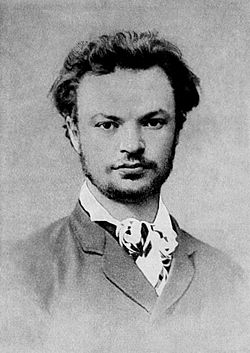Sergey Stepnyak-Kravchinsky
Sergey Stepnyak-Kravchinsky  |
|
|---|---|
| Born |
July 13, 1851 Novy Starodub, Kherson Governorate, Russian Empire (now Ukraine) |
| Died | December 23, 1895 (aged 44) Bedford Park, Chiswick, England |
Sergey Mikhaylovich Stepnyak-Kravchinsky (Russian: Серге́й Миха́йлович Степня́к-Кравчи́нский; July 1, 1851 – 23 December 1895), known in the 19th century London revolutionary circles as Sergius Stepniak, was a Ukrainian revolutionary mainly known for assassinating General Nikolai Mezentsov, the chief of Russia's Gendarme corps and the head of the country's secret police, with a dagger in the streets of St Petersburg in 1878.
Stepniak was the son of an army doctor and of a noblewoman, born July 1 (O.S.; July 13 N.S.), 1851 in Novy Starodub, Alexandrovsky Uyezd, Kherson Governorate of the Russian empire, now part of Ukraine. He received a liberal education, and when he left school, he went on to attend Military academy and the artillery school before joining the Russian army. He reached the rank of second lieutenant before resigning his commission in 1871.
His sympathy lay with the peasants, among whom he had lived during his boyhood in the country, which developed in him at first democratic and, later, revolutionary opinions. Together with a few other men of birth and education, he began secretly to sow the sentiments of democracy among the peasants, as a member of the Circle of Tchaikovsky. His teaching did not long remain a secret, and in 1874 he was arrested.
He succeeded in making his escape, possibly being permitted to escape on account of his youth, and immediately began a more vigorous campaign against . His sympathetic nature was influenced by indignation against the brutal methods adopted towards prisoners, especially political prisoners, and by the stern measures which the government of tsar Alexander II felt compelled to adopt in order to repress the revolutionary movement.
In 1874 Stepniak went to the Balkans and joined the rising against the Turks in Bosnia in 1876, and used that experience to write a manual on guerrilla warfare. He also joined the anarchist Errico Malatesta in his small rebellion in the Italian province of Benevento in 1877. He returned to Russia in 1878, joining Zemlya i volya (Land and Liberty), where he along with Nikolai Morozov and Olga Liubatovich edited the party journal.
...
Wikipedia
